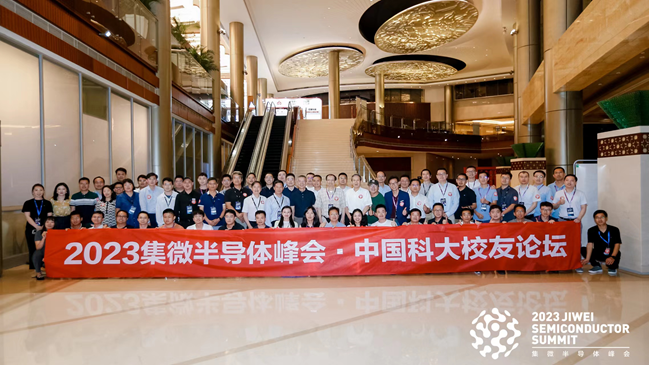
By Gabby Chen
(JW Insights) Jun 16 -- Alumni from the University of Science and Technology of China (USTC) gathered at the 7th JWSS (JiWei Semiconductor Summit) on June 3 and engaged in heated presentations and discussions, calling for down-to-earth efforts in seeking technology breakthroughs and facing off unprecedented industry challenges.
This was the fifth gathering of USTC alumni at JWSS held in Xiamen of southeastern China's Fujian Province on June 2-3.

Established in 1958 by the Chinese Academy of Sciences (CAS), USTC has played a leading role in China's science and technology growth. It moved in 1970 to Hefei, the capital of eastern China's Anhui Province - a rising IC industry city.
Wu Hanming, an academician of the Chinese Academy of Engineering, told the gathering that the crucial tasks for IC development include virtualization, intelligence, and engineering. These are the future trends.
The industry's current focus is on transforming technological achievements, which can be categorized as transfer and conversion. The transfer involves applying mature technologies directly in production, while conversion aims to turn experimental results into mature technologies for large-scale manufacturing, he added.
Zhu Huilong, an academician of the International Eurasian Academy of Sciences, also spoke at the event and stressed the need for advanced manufacturing processes in the development of next-generation devices. Zhu's team tackled challenges in NOR flash memory, specifically in automotive electronics and base stations, by developing a high-performance 3D NOR flash memory device utilizing vertical transistors. This innovative approach enhances storage capacity, device performance, and manufacturing cost efficiency.
Zhu is the chief scientist at the Integrated Circuit Advanced Process R&D Center Preparatory Technology Research Center of IMECAS (Institute of Microelectronics of the Chinese Academy of Sciences).
Long Shibing, the dean of the School of Microelectronics at USTC, disclosed that the school is building a laboratory for IC process and packaging testing, with an investment of RMB279 million ($39.01 million). This initiative focuses on developing key technologies and nurturing faculty and students.
To address talent shortages in the IC industry, the school prioritizes industry collaboration, partnering with top Chinese companies for targeted training programs, including Huawei, SMIC, Empyrean, a leading EDA software provider, and CXMT, according to Long.
In the panel discussion for investors, attendees shared valuable perspectives on market trends and strategic approaches for investing in the semiconductor sector during the market downturn. They include Zhao Zhanxiang, partner and CTO at Winsoul Capital, Zhao Wenjun from Hundreds Capital, Wang Wenrong from Fortune Capital, Zhang Chuanxi from Jade Stone Venture, and Zhao Fuguo, assistant general manager of Anhui Railway Development Fund.
During a panel discussion on the "Duration of the Semiconductor Industry Downturn," participants engaged in a lively discussion. They include Jiang Dabai, chairman of China Applied Technology, Han Zhiyong from Viewtrix Technology, Lu Xiangdong, chairman of Zbit Semi, Shen Fangzhong, vice resident of Heraeus (China) Investment, and Yuan Shun, CEO of Artin Chip.
In addition, alumni from Anhui University(AHU) in Hefei City also gathered for the first time at this year's JWSS. Established in 1928, AHU is a key comprehensive university and it set up the School of Integrated Circuits in 2020 to cultivate top talent for the industry.








